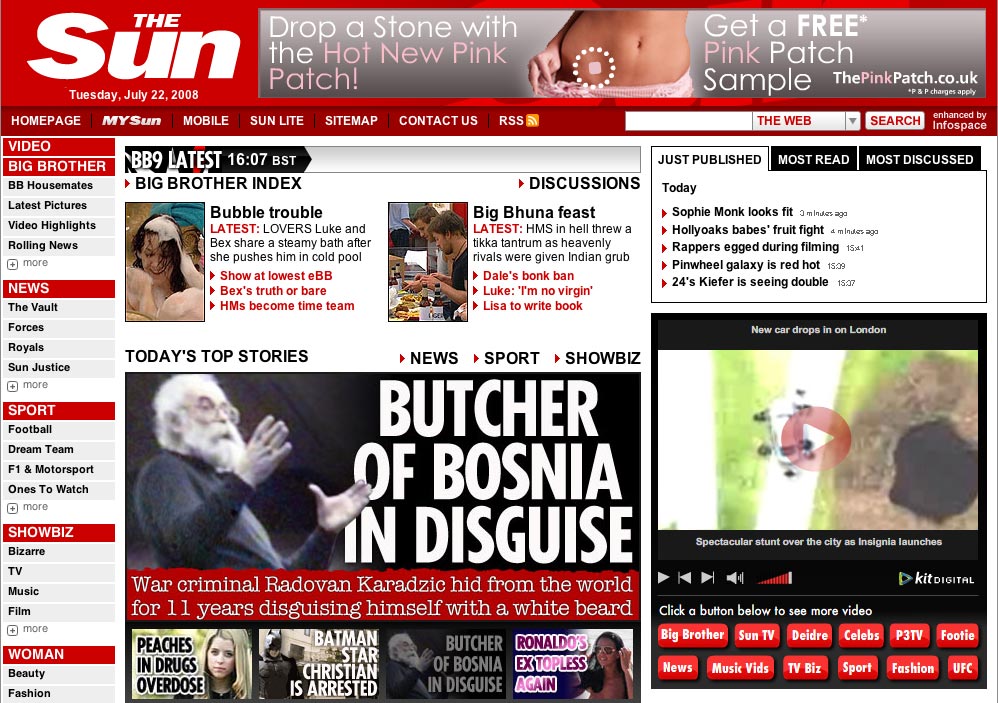It’s a story that has seen a hive of online activity: the BBC puts a new reporter in the army for six months (he’s never worked in the media before); puts out a documentary, based on mainly anecdotal evidence; the army suspends five people (not clear how many were a result, if any, of the investigation); the mainstream media reports on the whole thing (Telegraph report linked here, as an example).
A Facebook group has been created criticising the reporter for the programme – suggesting he should be tried for treason – which at the time of writing has 1,460 members.
Yet nowhere on the BBC website is there anywhere to post a comment. Although BBC news stories don’t always allow comments, this could have been ideal discussion material for a blog. But because there wasn’t any we’ve seen a flurry of activity on our own site, from users who probably wouldn’t normally use a journalism news site. Likewise, Digital Spy had a fair number of comments. The other place with high level of comment is an unofficial Army forum, Arrse (British Army Rumour Service).
People reacted to the question I asked on Friday ‘why the low ratings?’ with a range of suggestions.
Most, if not all, the commenters disagree that the footage was ‘shocking’ or ‘remarkable’. I agree with those that think the documentary had flaws in its method and reportage, but stand by my original comments. Whether it needed this type of ‘undercover documentary’ to give exposure to racism and bullying in the army (anecdotal evidence, or otherwise) is another matter (that was the discussion I was expecting to be provoked).
Bizarrely, if you currently search for ‘Russell Sharp’ on Google you’ll come to our own website, rather than the BBC’s. While we welcome the additional comment and discussion on our own site, would this not have been better placed on bbc.co.uk?
I emailed the BBC Press Office a number of questions about their online management. Initially I was told that there had been an opportunity for feedback in the phone-in on Radio 5 Live, immediately after transmission. I know, I tried to listen. Russell Sharp was supposed to be on it, but was replaced at the last minute – the explanation on air was that he was (or had been?) ‘holed up’ in an edit suite.
I’m posting here the full response from a spokesperson at the BBC in regards to the response to the programme.
I asked why the BBC decided not to open up comments to the public:
They said: “It’s good to see our journalism promoting debate and discussion. We don’t always provide an opportunity for people to comment on every story posted on the news website – decisions are taken on a case by case basis. In this case there was also a phone in discussion on 5Live which examined the issues raised and heard from people with an interest in the story.”
I asked if they were disappointed in the low ratings. They said: “The broadcast of Undercover Soldier last week is absolutely in keeping with BBC One’s commitment to placing agenda setting investigative journalism at the heart of the peak time schedule. We are proud to have ensured the maximum number of viewers had the opportunity to see it. An audience of 2.3 million viewers alongside the media exposure it brought to the issue of bullying in the army is an illustration of public service broadcasting at its best.”
I asked them what they thought about this story that appeared in the Sun, which suggested Sharp could be called back into the army.
They said: “The Sun approached us for a response to their story on Friday but sadly didn’t see fit to include it in their piece. It was as follows…..
‘We would never comment on a hypothetical situation but the MoD will no doubt want to focus on the issues raised by the programme rather than the individual who helped raise them. We are cooperating with the Army in their investigations’.”
The discussion continues, as does our blog traffic. When I posted on Thursday I expected a few reactions from journalists criticising the reportage of the documentary, to explain its low ratings, or a comment on the interests of the viewing public.
Instead, it became apparent that there has been very little outlet for the viewers of the programme to voice their concerns with the BBC’s methodology and subsequent reporting.

 Former head of mobile strategy for News International (NI), Andrew Bagguley has been hired as a consultant for Guardian News&Media (GNM), as the title begins its move into the mobile market.
Former head of mobile strategy for News International (NI), Andrew Bagguley has been hired as a consultant for Guardian News&Media (GNM), as the title begins its move into the mobile market.
